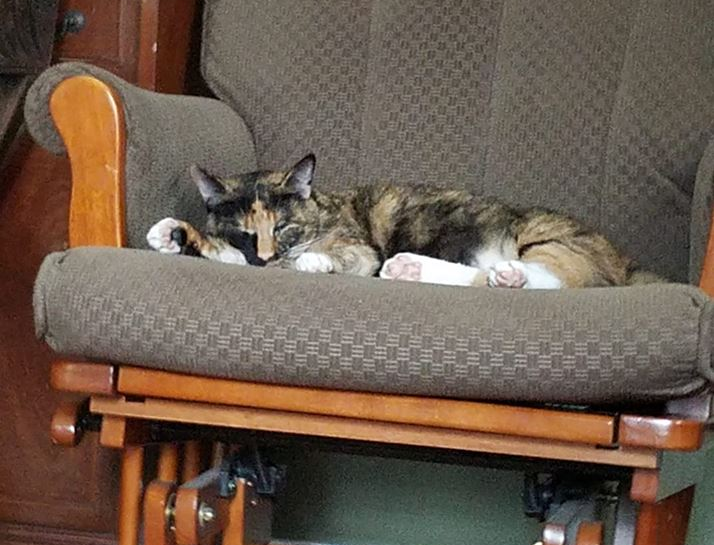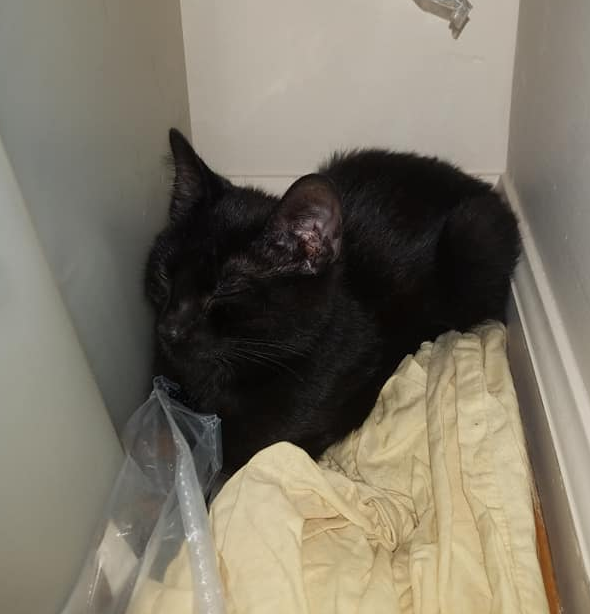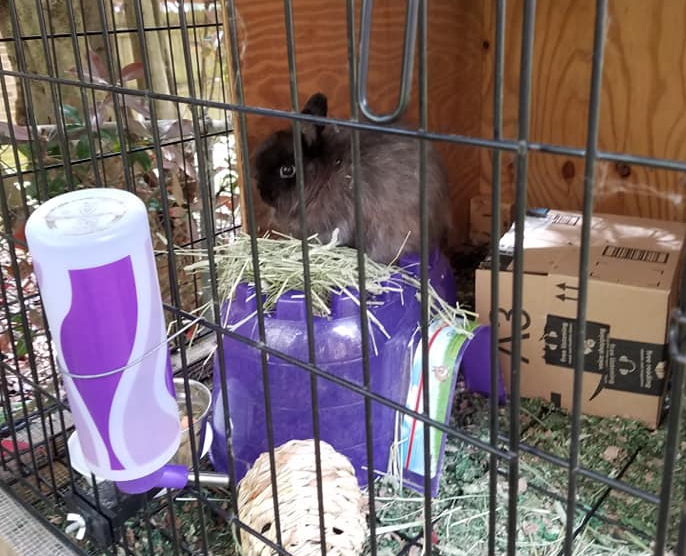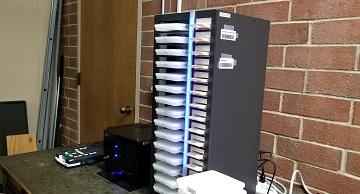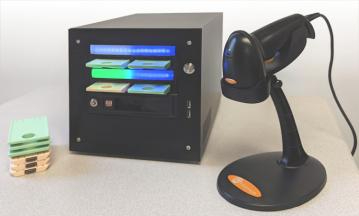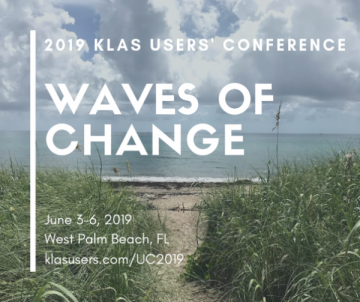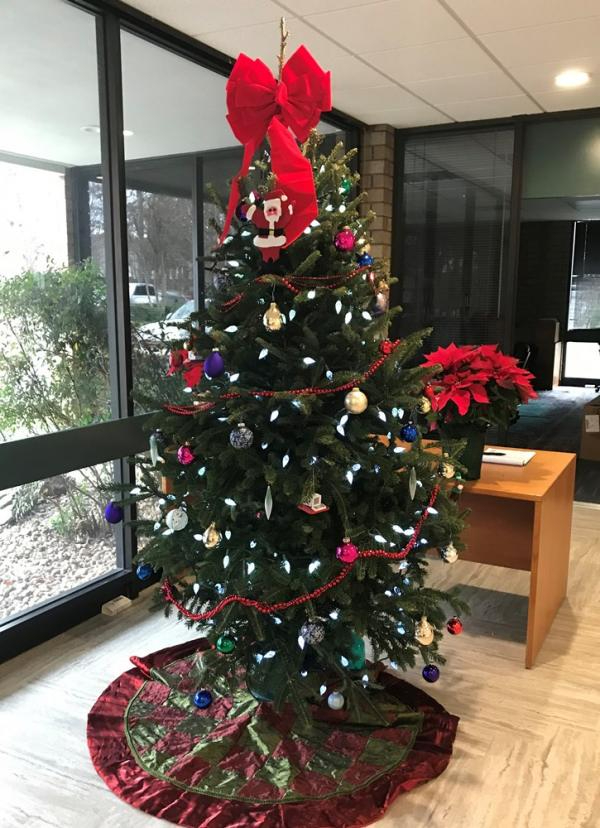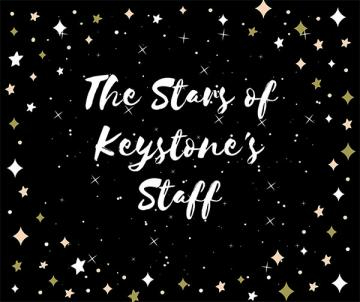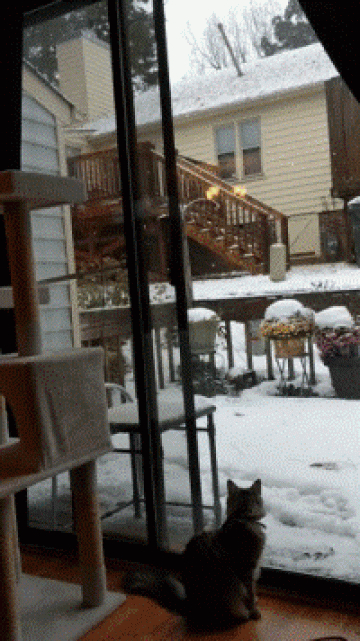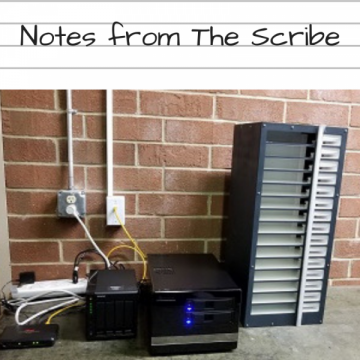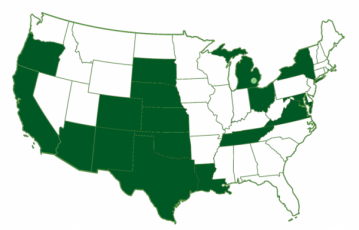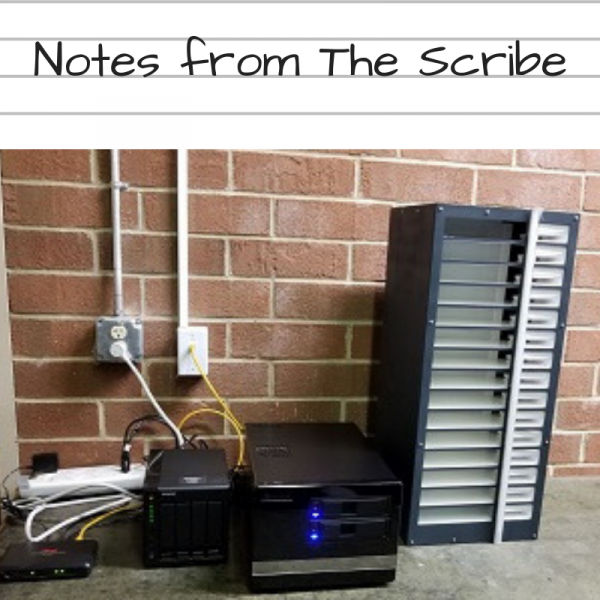- Andrea Callicutt
- News
The KLAS Program Committee has been hard at work and has a new, freshly updated Overview Schedule for the 2019 KLAS Users' Conference ready for you. This is still a draft schedule but has several changes from the version published two weeks ago.
So, how did the committee get here and what do they still have to do?
Here's a brief look at our 2019 KLAS Users' Conference Program Committee Planning Timeframe...
October
- Establish Committee
- Set meeting schedule & expectations
- Begin reviewing feedback from the previous conference
November
- Publish initial Overview Schedule with conference framework with no specific session topics or speakers based on info from the site visit, logistics committee, etc.
- Send out a call for proposals
- Continue reviewing feedback from the previous conference
December
- Continue reviewing feedback from the previous conference
- Review session proposals as they are received
- Identify / discuss other possible session topics
January
- Finalize list of session topics based on conference feedback, proposals received & ideas presented by committee members
- Slate session topics based on the type of session
- Publish updated Overview Schedule with slated session topics
February
- Review & Update Overview Schedule document
- Assign committee member liaison for sessions
- Refine session titles & descriptions
- Recruit additional moderators / presenters
March
- Continue refining session titles & descriptions
- Publish the first draft of the conference agenda
- Communicate deadlines to moderators / presenters
April
- Continue communicating with moderators / presenters
- Review / update Agenda as needed
May
- Publish finalized Agenda document
- Send out presentation template
- Collect presentations for publication
June
- Conference!
- Katy Patrick
- News
The addition of the Service Queue and the transition to duplication service is a huge change to patron services. One thing that it will likely have a big impact on is how we serve Series.
In the new service model, Nightly Duplication functions are used to refill the Service Queue, similar to how Nightly Autoselect works now. Duplication Orders are constructed from this Queue (by pulling Titles in order from the top of the Queue) for use with the old PCC Cartridge Builder program, the Scribe unit, or Gutenberg Bespoke.
One of these functions is dedicated to serving Series. Like all nightly functions, the function is constrained by the nightly setup parameters. There are separate functions for the "old" nightly (termed Physical delivery method in the new setup), and the new Duplication delivery method, used for populating the Service Queue.
Read on or download the attached file for the details of how the Duplication - Series nightly function will work!
Duplication – Series Nightly Function
The Duplication - Series function checks the patron's Series Preferences and applies exclusions as specified in the function setup, and then starts adding the books to the Service Queue in series order until either:
- It reaches the end of that particular series list, or
- It reaches the Max Per Function specified in the function setup.
It is expected that the library-wide Max Per Function for the Duplication - Series function will be set high enough to allow most series to be added in full to the Queue, but low enough to keep lengthy series from completely dominating the queue. However, you can take whatever approach you think will best serve the majority of your patrons.
Determining the best Max Per Function for your library will likely take some trial and error; you can adjust it as needed until you find the right fit.
What about hard-to-serve patrons?
For patrons that strongly prefer to continue receiving their series one book at a time, or who want a whole series in a row no matter how long it is, a patron-specific Max Per Function can be specified. You will be able to set that patron’s Max Per Function to meet their specific needs without affecting service to your other patrons.
Note: As part of our adjustments to Nightly to allow Duplication service, you no longer have to specify every function for a patron if you only want to override one or two. You only need to create a patron-specific function for the ones to override. Other functions will still serve that patron using the library-wide settings.
What if a Series Preference has multiple Media types?
Prior to Version 7.7, KLAS has been able to serve a series in multiple Media. This was particularly helpful during the cassette to digital transition, when parts of a series may have been available on RC while later additions were in DB.
It was also possible to serve a series in both DB and BR based on which version is available when the prior book is returned—however, this approach is only possible when the different versions are equivalent. The increase in anthology cartridges from NLS (i.e. books 1-3 in a single DB) make this less and less viable.
Moreover, in the duplication service model it is expected that all titles in a series will always be available for duplication. Though there may be exceptions (titles that were never made available on BARD, but which may be acquired in other formats), they should be rare.
Our decision was to restrict series to either duplication or physical circulation—not both.
This will not require you to remove the other Media from existing Series Preferences or to add a new one!
When KLAS serves a series, it will now check to see if any of the Media listed have an associated Service Queue. This happens when the series is first created, when a previous title is checked in, or when a series is restarted.
Example: If a patron has a Series Preference for Patterson’s Alex Cross series in RC or DB media, KLAS will check to see if the patron has a Service Queue. When it finds a DB Service Queue, it will serve the series using the Duplication – Series function instead of physical circulation.
What will happen if I restart a series?
The Restart Series function will now clear the Has-Hads for all titles in the series but not take any other action. In other words, that series will be eligible to be added back into the Service Queue the next time it refills, but it will not be added to the Queue immediately.
This allows you several options:
- Letting the series go back into the Queue after the other titles already on the queue have been sent.
- Using the Fill button on the Service Queue tab to manually refill the Queue right away (according to the rules and maximums set up in Nightly Processing and on the patron’s Profile tab).
- Removing less wanted Titles from the Queue before refilling it, potentially allowing more of the series to be selected right away.
- Manually add a few Titles from the series to the Service Queue, bypassing the Patron’s reserves and requests if your Nightly usually checks for those before checking series.
Final note
As a reminder, while KLAS 7.7 is nearly complete, changes are still being made in response to field testing with the Scribe and internal testing with the Gutenberg.
As we gain experience with the duplication service model, everything is subject to further adjustment, refinement, and re-evaluation to serve you better.
Download this article
DOCX - Duplication Service - Series
PDF - Duplication Service - Series
- Craig Hayward
- News
Hi all,
Here’s the Notes from The Scribe for January 2019.
This last month we played around testing out the limits of the system with many more cartridge runs, thanks to having all 25 staff on the service now. This means we can go much more fully into things and do larger groups of testing. The library’s Duplication on Demand Committee met again so we could prepare to roll out the service for a pilot patron group before everything goes live.
The first big news, is that we have now put 12 patrons on the service who are piloting the service. We had mentioned starting them in Mid-December, but some adjustments had to be made to the system first. This week we'll pair them up with cartridges and set them loose. We'll get feedback and tune things for putting more patrons on this service this early spring. At that time we will begin offering this service to all new patrons and pull from a list of more existing patrons to add to the service. This will grow over time. Currently it stands at 3000 or so.
The other big news is that we're about to get Version 7.7 running live in our library. If any of you attended Katy's webinar on version 7.7 you know that contains a great many improvements and features. We have been treated to experiencing a bunch of these things by being able to test out this new version for use with The Scribe. One notable piece is a button in the patron book search results to add items directly to the Service Queue. The roll-out should happen some time in the next week or so. One noted strength of being a tester of the new software version is our staff's ability to check things out and test some things before we go live. Staff currently is taking release notes for this new version and double-checking things before we go live just to make sure when we flip the switch we'll be good to go. We have learned from past updates that sometimes things do get "broken" in the process of updating things. So this kind of feedback is valuable and helpful, in case something needs to still be adjusted before we go live. It also will help prepare staff for the overall transition in service. As we say around here "this is getting real".
Here are some photos of this month's testing of more cartridges (patron orders) at the same time on a larger scale. The results are promising
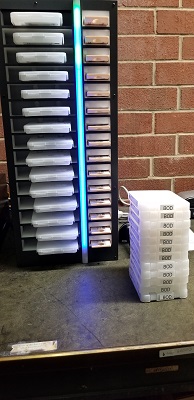
That's all for this edition of Notes From The Scribe. The next edition will come out with the next round of updates and new features.
- Katy Patrick
- News
While the Scribe System already has a lot of great features, we felt that there was still room for improvement. Two issues that we specifically wanted to address were:
Capacity
The NUC computers we were using as the brains of the Scribe System only have capacity for a portion of the Talking Book collection, and we found that not all libraries have the internet speed and bandwidth to reasonably download the books that were not included in the cache. We did everything possible to reduce the amount of downloading needed, but especially when it comes to serving walk-in patrons, it became clear that some libraries just need the whole collection to be stored locally.
Flexibility
We were also aware that not every location would need a 15-slot cartridge tower. Some libraries were interested in having a second duplication station at their front desk for walk-in convenience or even self-service, and the full tower would be much more than was actually needed. Additionally, there was interest in making duplication stations available at outreach centers or even public libraries, but again, these needed to be smaller and as foolproof as possible.
The Scribe Mini answers both of these issues!
An upgrade from the tiny NUC computers, a Scribe Mini is still much smaller than your standard workstation computer but has the capacity to store the full NLS collection plus local titles. On top of that, it has room in the case itself to host four onboard cartridge duplication slots plus LED indicators.
Because of this, the Scribe Mini can be used as a standalone duplication station! If the four cartridge slots aren’t enough, the Scribe Mini can also be used to pilot a 15-slot cartridge tower... or even two towers, for a grand total of 34 cartridge duplication slots!
A complete Scribe System will now include a Scribe Mini (instead of a NUC), a Scribe tower, and a barcode scanner.
The Details
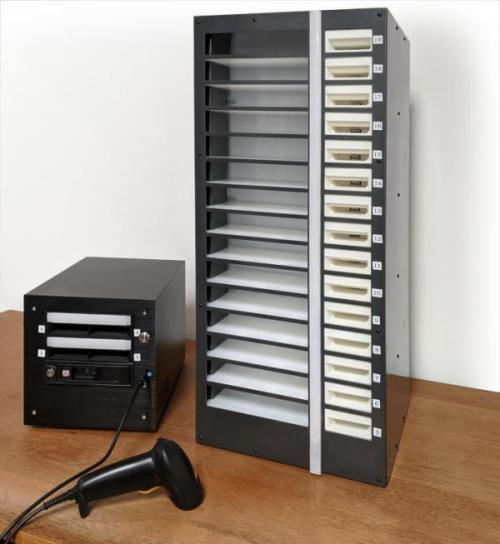 The Scribe Mini still requires internet access, but all book downloads will be performed overnight, keeping its local collection up-to-date automatically. During the day, the connection will be used to communicate with your KLAS database about Duplication Orders, and to receive the occasional software update from Keystone.
The Scribe Mini still requires internet access, but all book downloads will be performed overnight, keeping its local collection up-to-date automatically. During the day, the connection will be used to communicate with your KLAS database about Duplication Orders, and to receive the occasional software update from Keystone.
The Scribe Monitor web page will still be used to display real-time information about the system and the status of each cartridge slot (including the 4 onboard slots and 15 or 30 tower slots), accessible from wherever you are.
For more details and technical specifications, please review the updated Scribe Specs & Cost document available for download below.
Wait, did this delay...?
While we think this is an awesome new option, we understand that some of you may be concerned that we’ve spent time developing hardware instead of on a new feature you really need, or on getting your organization upgraded to version 7.7. But don’t worry—while we are a small company and projects inevitably cross departmental lines, the new Scribe Mini was developed by different people than the ones working on other high-priority projects. Work on this new Scribe hardware did not delay your upgrade or new feature.
So how do I get one?
One Scribe Mini is included as part of each library’s free Scribe System. (If you have already received a Scribe system with a NUC, you may contact us to discuss whether you need an upgrade.) Additional Scribe Minis, Scribe towers, and complete Scribe Systems may be purchased; please see the latest Scribe Specs & Cost document for pricing information. Note that there is a price increase due to the additional hardware costs.
The Scribe Mini and Scribe towers are assembled in-house, but once ordered, we will build them as quickly as we can get the parts in (and without pulling people off of other projects).
Let us know if we should plan to build a Scribe Mini for your library!
- Andrea Callicutt
- News
Woo hoo!!
We don't need the "Under Construction" graphic anymore!!!
Yes, we can finally say that all the workmen are gone, our offices are unpacked, and we are settled back into our revamped meeting, training, and other spaces here at 8016 Glenwood Avenue. In fact, we've even rehung wall art and hosted our first KLAS Admin Training with all of the renovations being done.
To celebrate, here's a photo collage showing the Keystone developers' area and the office kitchen before and after the work was completed.
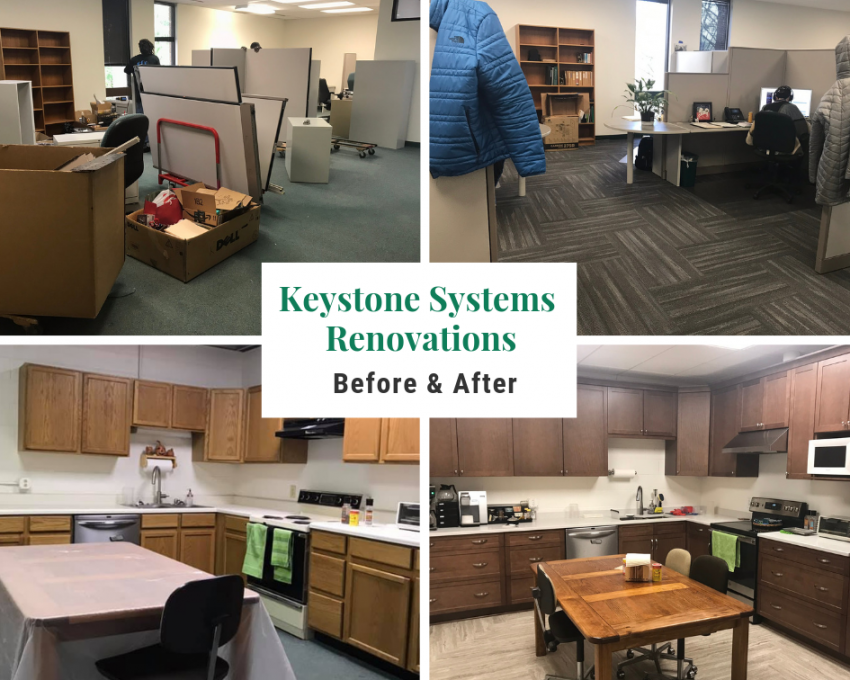
For all of our renovation pictures including all the "Afters" that we uploaded today, check out our 2018 Keystone Construction photo album on our Facebook page.
- Andrea Callicutt
- News
I pulled out my new 2019 calendar and all of a sudden the next KLAS Users' Conference is THIS YEAR and not NEXT. But, there's no reason to panic because the Program and Logistics Committees have been actively meeting on a monthly basis since last fall and have made some great progress in planning for your attendance. Do you know who those people are and what kind of work they do? First, let's introduce you to the people who are bringing you this year's "Waves of Change."
Who are they?
Below are the persons serving on the Planning Committees for the 2019 KLAS User's Conference.
2019 KLAS Users' Conference Program Committee:
- Chandra Thornton, KLAS Users' Group Vice President, Program Committee Chair, 2019 KLAS User's Conference Host, Palm Beach County Library System Talking Books Library
- Erin Pawlus, KLAS Users' Group Secretary, Arizona Braille and Talking Book Library
- Sue Walker, KLAS UC 2018 Host, Idaho Commission for Libraries Talking Book Service
- Vanessa Meadows, KLAS UC 2017 Host, Georgia Library for Accessible Statewide Services
- Cyndi Hammonds, California Department of Education
- Amy Ravenholt, Washington Talking Book and Braille Library
- Katy Patrick, Keystone Systems
- Andrea Callicutt, Keystone Systems
2019 KLAS Users' Conference Logistics Committee:
- Craig Hayward, KLAS Users' Group President, Logistics Committee Chair, North Carolina Library for the Blind and Physically Handicapped
- Sarah Smedley, 2019 KLAS User's Conference Host, Palm Beach County Library System Talking Books Library
- Nancy Reese, KLAS UC 2018 Host, Idaho Commission for Libraries Talking Book Service
- Andrew Shockley, KLAS UC 2015 Host, Oklahoma Library for the Blind and Physically Handicapped
- Debbie Martin, Brevard County Talking Books Library
- John Mugford, New Mexico Library for the Blind and Physically Handicapped
- Andrea Callicutt, Keystone Systems
What do they do?
The Planning Committees usually meet on a monthly or bi-monthly basis depending on what work is currently needing to be done. The Logistics Committee focuses on planning the conference's transportation, catering, registration, welcome reception, and networking excursion. The Program Committee plans the conference content by identifying topics of interest, seeking out presenters, and creating a schedule all while trying to appeal to the varied job functions, skill sets, and learning styles of our attendees. Both pay close attention to the commentary and ideas that arise from previous year's feedback forms and follow-up surveys as they plan. They also look for new ideas that could benefit our attendees and bounce them off one another.
When an organization offers to host a conference we do ask if a member / members of their staff can serve on each committee the year before, the of, and the year after they host. We also encourage other persons to serve on the committees who have an interest in contributing to the planning of the conference's content or the details of attendees' experiences while there.
At this time, much of the preliminary logistics planning has been completed and that committee is now focusing on more detailed decisions, such as our reception entertainment and which menus to choose for provided meals. At the same time, our Program Committee has now done a thorough review and discussion of session feedback, sent out a call for proposals, created an initial overview schedule, and will soon be contacting additional possible presenters and finalizing session topics with the goal of publishing the next draft of the conference schedule before January 31.
If you have any questions about how these committees operate or they work they do, please feel free to contact anyone serving on them. Or, if you are interested in serving on a committee in the future, contact one of your KLAS Users' Group Officers or the current committee chair.
- Andrea Callicutt
- News
We thought you might enjoy some photos of our holiday decor and staff celebrations here at the office.
This is Keystone's 2018 lobby Christmas tree. It greets all the visitors who come to our front door.
Here we are gathered around the table enjoying our office holiday potluck lunch. After we eat lunch, we enjoy a cutthroat Dirty Santa gift exchange. The presents piled in the middle of the table are just waiting for us to draw numbers and start the game.
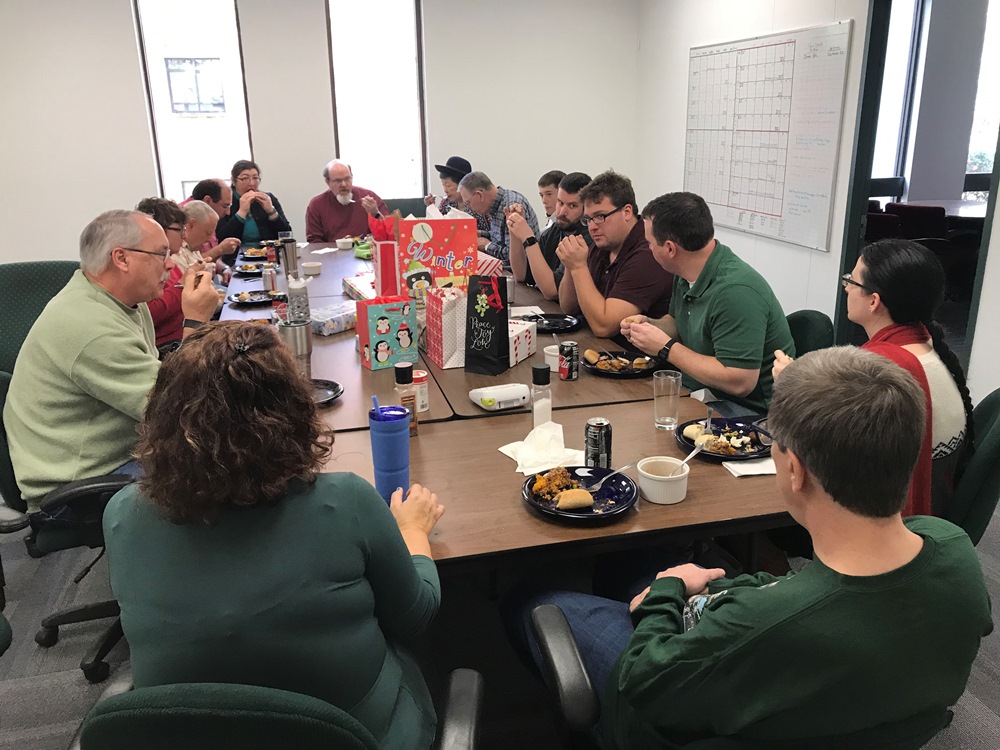
For more pictures check out the 2018 Holiday Celebrations photo album on Keystone's Facebook page.
- Katy Patrick
- News
The snow has melted, the Holidays are rapidly approaching, and it's time for another post in our "Stars of Keystone's Staff" series. Each will include some basic info and insight into one of our staff members. We hope these posts will provide you a look into who makes up our diverse, supportive, and knowledgeable staff.
Basic Stats:
Name of Staff Member: John Owen
Year Hired: August 2002
Current Job Title: Senior Support Analyst

Getting to Know You Q&A:
Q: What is your favorite part of your job?
A: Developing relationships. Of course, helping but always building trust.
Q: What did you do before working for Keystone?
A: Technical and sales support for a major semiconductor manufacturer and point of sale company.
Q: What are your hobbies outside of work?
A: My grandchildren, my church and my music, and Alabama Football...Roll Tide!
Q: If you could go anywhere on vacation, where would you go?
A: Fiji and Vietnam
Q: Do you have any pets? If so, what kind and what are their names?
A: One cat, Belle Belle hired us six years ago.
The grandkids:
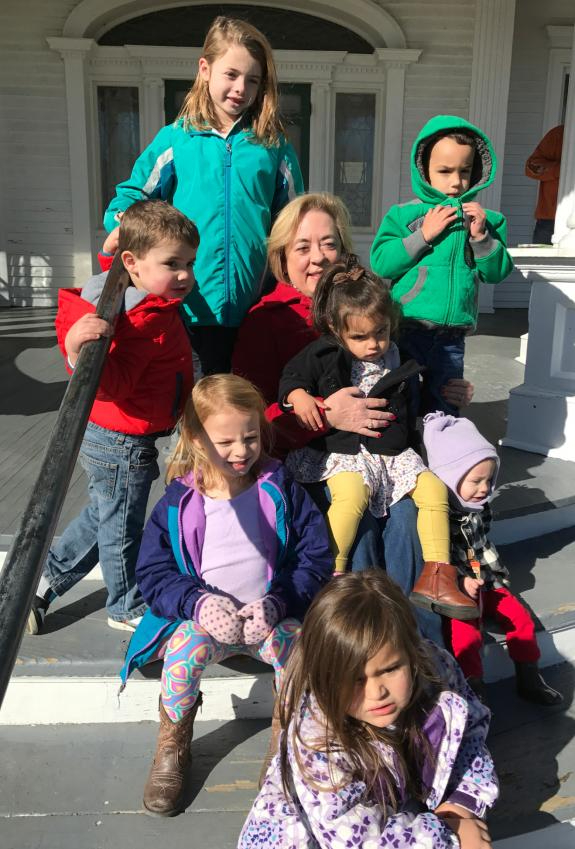
John working with kids in Haiti:

Belle Belle, managing her staff:
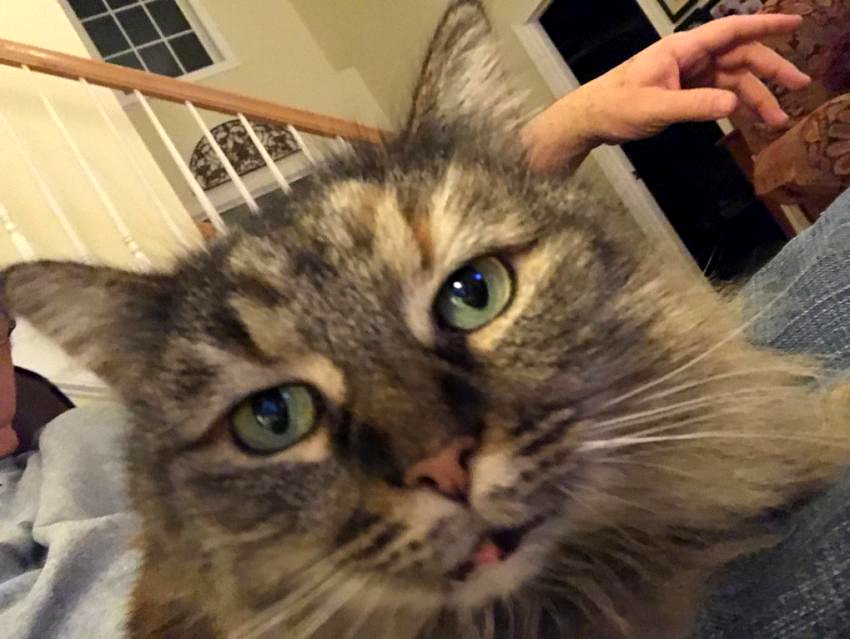
And a throwback to high school basketball--can you tell which of these players is John?
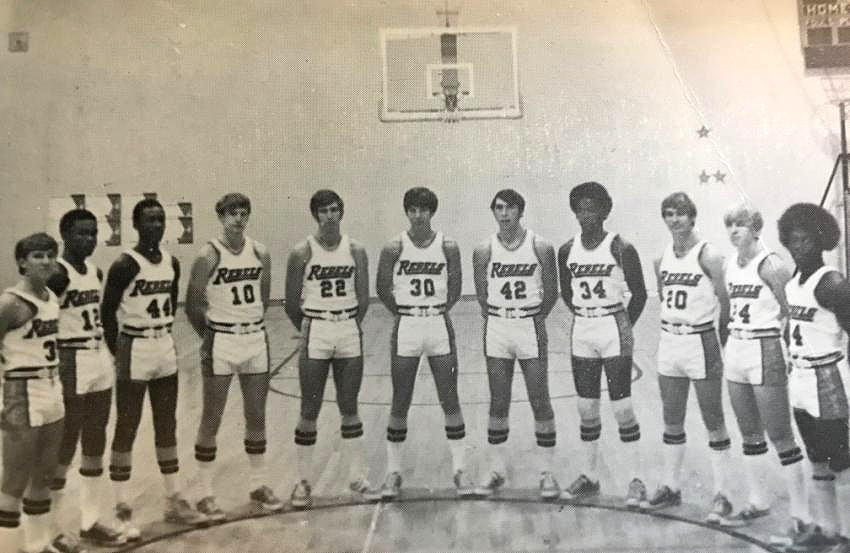
- Andrea Callicutt
- News
For this week's blog post, we thought you'd enjoy some of our staff's photos of the snow we got in Raleigh over the last couple of days.
Let's start with a .gif of Katy's cat Paws watching the snowfall through the sliding glass door of her townhouse.
Here was Drea's view out her home's front door on Monday.

Also, these two pictures of the table, chairs, and pergola on her upper deck show just how much snow accumulated. We got approximately 7 inches of snow on Sunday and even more fell on Monday morning. Raleigh usually averages 6 inches of snow total per season.
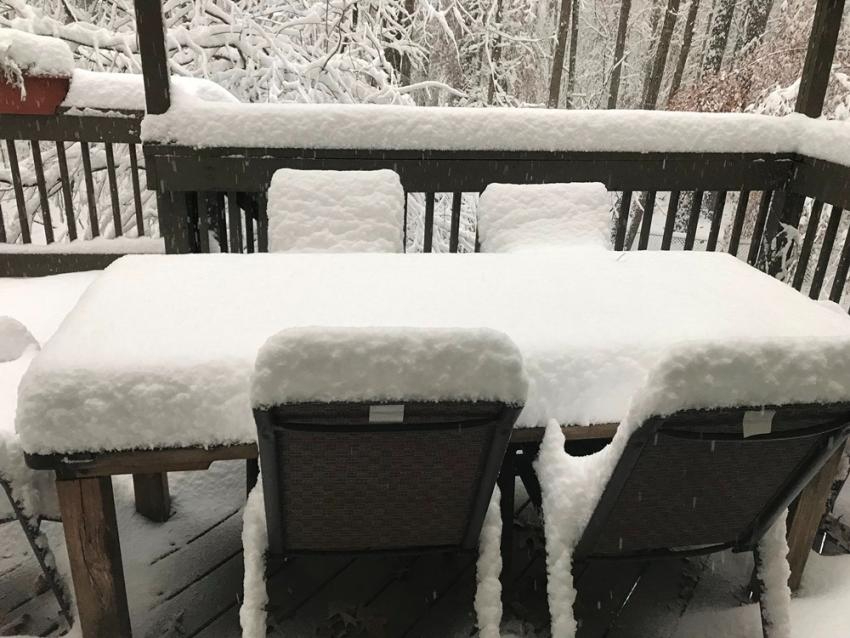
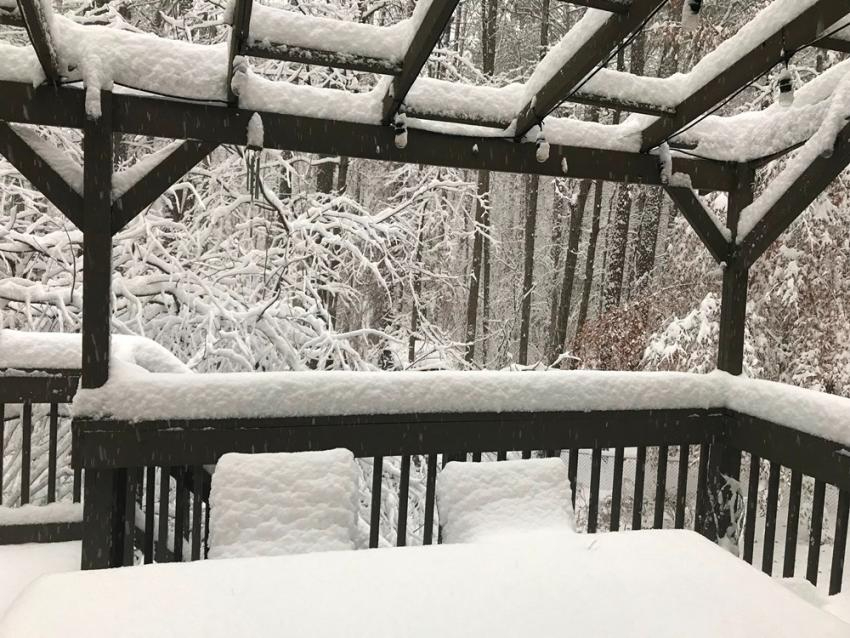
Finally, this is what her backyard looked like blanketed in all the white stuff. Her dogs definitely didn't appreciate it as much as she did. You can see their tracks going off the lower deck and around the firepit.
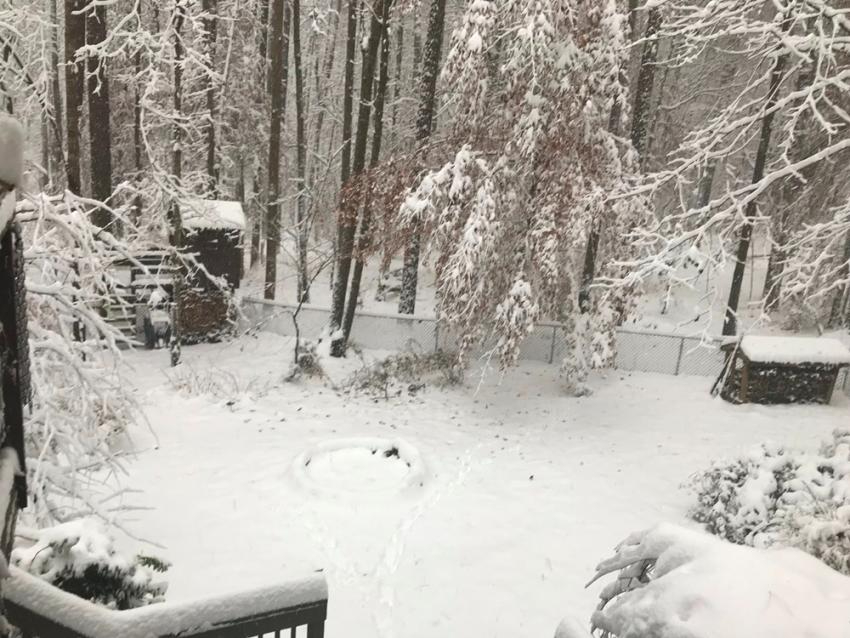
Nancy shared this picture trees in her backyard covered in snow.

Katy also enjoyed the snow on the tree outside of her window.

And, her kitty, Paws, enjoyed watching it fall through the large sliding glass door.
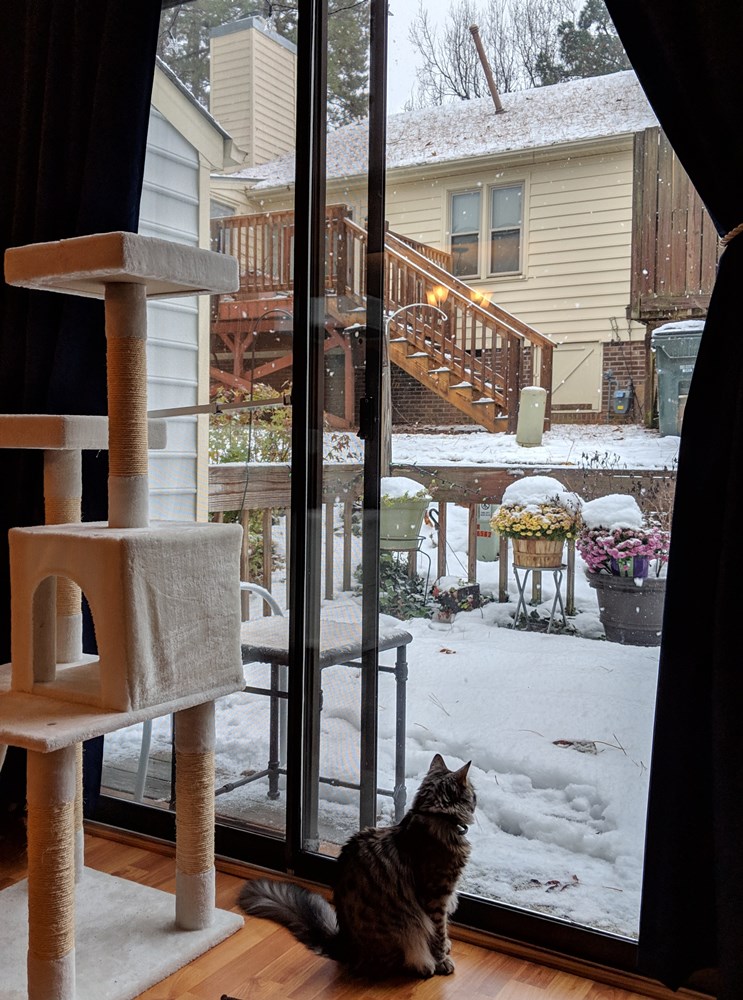
- Craig Hayward
- News
Hi all,
Here’s the Notes from The Scribe for November 2018.
This will be a shorter version. This month we played around testing some limits of the system itself and some improvements to our own processes as we get ready to roll out this service in full. The library’s Duplication on Demand Committee has met twice and we are shaping how our service will work moving forward with this exciting offering. Let’s go over some brief highlights since I last updated you all.
In November we finally put all staff on to the service as a test group so that we could run larger batches of duplication jobs. What we discovered with this process is that The Scribe is up to the task (so far). The speed of duplication whether you are copying one cartridge or 12 doesn’t really change much. In our sample, one cartridge typically takes 3.5 minutes to put 5 books on one cartridge and 4.5 minutes to put 5 books onto 12 cartridges at the same time, in 2 different locations. I say 12 because that’s all the staff we had up on the system at the time we started the tests. We still need to run the remaining cards for the rest of staff (13 more people) and put together cartridge sets. Once we have that we will look at 15 at a time. We do note that there seems to be a kind of sleep mode from starting out the day running this. There is a little delay when you start up first thing and put everything in motion, which isn’t as pronounced the rest of the time. As we go forward and the units run more throughout the day we will see how this pans out. But if you want to run 12 cartridges (patron orders) at the same time, this device does that well.
The next phase will be to run all cartridge slots on both units at the same time. This should happen in the next week or so once we get all staff setup.
Another thing of major note, the committee decided that rather than calling the service Patron-Centric Cartridge or PCC service, we have adopted the name Books on Demand or BOD. The group decided that this would be easier for the patrons to understand. The term Patron-Centric Cartridge is meaningless from a patron standpoint. The method behind how those books (and magazines) are served doesn’t matter to the patron. While this is a PCC type of Duplication on Demand Service we will refer to it as Books on Demand or BOD for simplicity. Also this leaves open the option of using other types of delivery for patron reading materials.
One final note, a group of 15-20 patrons will begin pilot testing the system in mid-December. We have worked out most of the kinks in the system, but the next step is patron feedback that we’ll get so we can fine tune some things. The hope is to move beyond the pilot by mid-January and roll things forward. We think we’re on target for that to happen. As we say around here "this is getting real".
Here are some photos of this month's testing of more cartridges (patron orders) at the same time on a larger scale.
As cartridges are inserted The Scribe recognizes them each and, if all is well the light turns blue to indicate that the cartridge is seen and ready
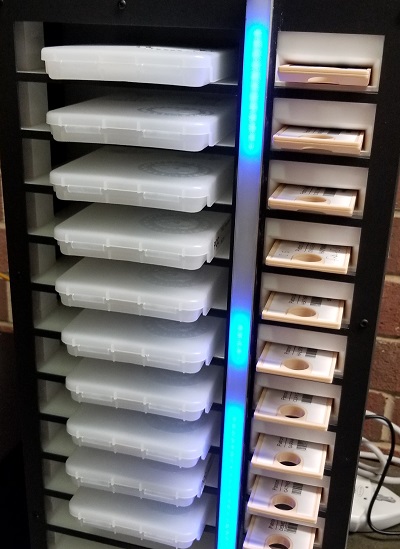
All is working well. Cartridge slots filled with cartridges and all are blue indicating that the duplication process is beginning
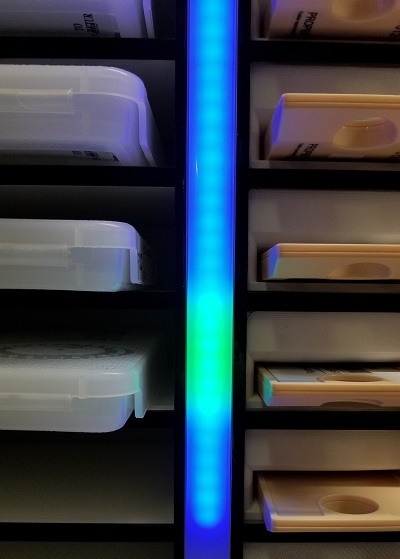
When a patron duplication job completes, and the cartridge is checked out, the light goes to green that tell you to pull it and send it out in the mail
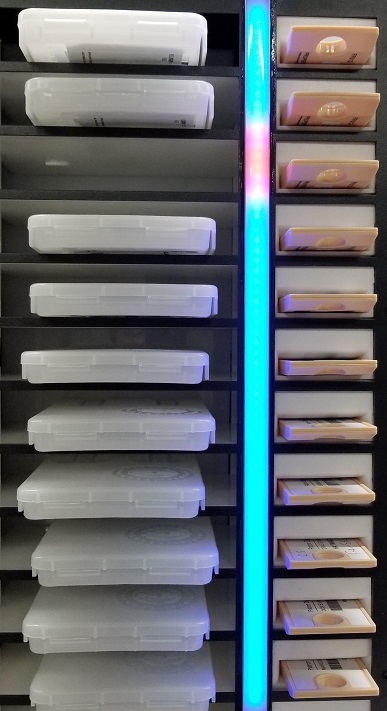
When a red light comes on it means there’s an issue with the cartridge or the patron account. These red cartridges get pulled and put to the side with the case (not shown) to be dealt with after the run. In this case there weren’t actually any books added to this new patrons service queue by staff.
That's all for this edition of Notes From The Scribe. The next edition will come out with the next round of updates and new features.
- Katy Patrick
- News
Hello, KLASusers! As we start looking towards the Holidays, I thought this might be a good time to check in with the developers and let you all know where we stand with the big projects that we know you all have on your Christmas Wishlists.
KLAS 7.7 is coming!
I know we’ve been talking about this one for a while now. This is a huge update that impacts every part of KLAS, so getting all the last pieces and touch-ups and testing in place has been a big project for us. Additionally, as hosted customers are upgraded to version 7.7, they will be migrated to our new server.
It’s important to keep our hosting stable, speedy, and secure for you, so we put a lot of work into getting the new server ready for you. It’ll be faster, more secure than ever, and uses a new method for rapid recovery to a backup server in case of failure.
I will be hosting a webinar to take a closer look at 7.7 later this month, but some of the improvements will include:
- Structural, back-end changes. While these won’t be visible to you at all, we expect them to improve performance and free up some system resources.
- UTF-8 support. This essentially extends KLAS’ character set, allowing for better handling of diacritics and other “special characters.”
New installer. This will usually remove the need for admin access to install or update, make installation and updates easier, and enhance security. It’s a win-win-win! - A new method of connecting to the database server. We are implementing PASOE, which will eliminate the need for OpenVPN and reduce or eliminate lost connections due to network drops.
- APH Census improvements. More back-end changes, this time to how and where APH data is stored. These standardizations will improve our ability to support various options for keeping up with the annual APH Census and ensure accurate, reliable reporting.
- SCRIBE! High-capacity PCC duplication using Scribe will be fully-functional. This will include the brand-new Service Queue Tab, the ability to include firmware updates and newsletters on all duplicated cartridges, and other upgrades to ensure a flexible and sustainable workflow.
This update will go Live for a limited release in January.
We need this to be a limited release because of the new server and the sweeping back-end changes. In the (unlikely, but possible) event that something goes sideways, it’ll be better for everyone if we can fix a few databases and get the others right from the start, instead of needing to scramble to get a fix in fast for everyone.
We expect to open the doors for everyone in February.
What about Gutenberg?
Don’t worry—this hasn’t fallen by the wayside. As announced this summer, we’re building on our work for Scribe to integrate with NLS’ Gutenberg as well. In fact, we’re nearly finished!
Gutenberg support will be included in the next update after 7.7, and the rollout should follow close behind the main release.
While we’re making good use of North Carolina’s robust testing of our new systems and workflows, we’ll need some extended testing on Gutenberg specifically. We know a lot of you are eager to get on this as quickly as possible, but we also don’t want to set you up on something that doesn’t quite work. We’re balancing speed and prudence, and expect to put this out on limited release in February.
Future Updates?
With the big structural changes and server swap all taken care of, we expect our release schedule to pick back up following the 7.7 release. We have a lot of updates and improvements on our to-do lists, and are eager to get them out to you.
If you have requests for anything to add to our list, or want to make sure we prioritize something you’ve been waiting on, please add it to the KLAS Development Suggestions forum! Posting there will ensure that your suggestion or request is seen by the KLAS Development Advisory Committee (KDAC), who will help us evaluate how valuable it would be to other Users. It also ensures that we have a written record of what people are interested in, which can easily be referred back to or passed among the developers.
We can’t wait to start 2019 off right with some fantastic new features! Thank you all for your continued support, and Happy Holidays from all of us here at Keystone!
- Andrea Callicutt
- News
Our last "Please pardon our dust" update was in early August, but the renovation work here at Keystone is still ongoing. We are now well into phase 3 and now are certain that the light at the end of the tunnel isn't an oncoming train. In fact, there's sunshine, new paint, redesigned kitchen cabinets, and shiny new lobby flooring.
Read more about waht has already been done in our "Please pardon our dust" Part 1, Part 2, and Part 3 posts. In phase three of the office renovation project, workmen started taking down all the old ceiling tiles, removing and replacing ductwork, ripping down wallpaper, rewiring electric and network cables, put fresh paint on walls and doors, and began prepping our office breakroom / kitchen to have all the cabinets replaced. They are almost ready to take out the old flooring and put in the new, put in the new ceiling tiles, and remove / replace the kitchen cabinets. Luckily for all of this work, no employees had to go move into temporary space, but we did have to store some equipment in other areas and learn to navigate the office without distrubing the workmen or opening a bathroom door without getting wet paint on our hands.
To see all the photos, check out the 2018 Keystone Office Remodeling album on our Facebook page.
This is the ceiling of the lobby with all the ceiling tiles and framework and old ductwork removed.
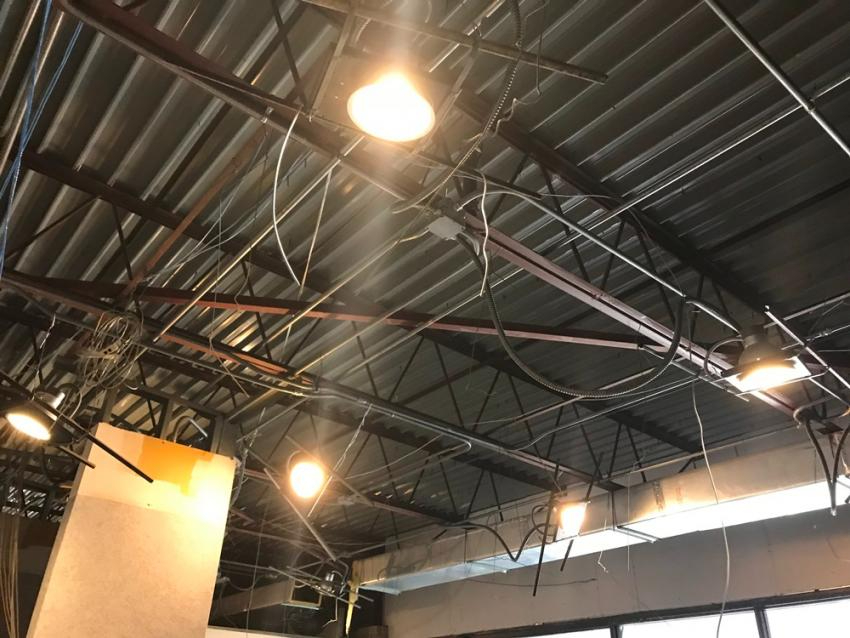
We had all the wallpaper in the lobby removed and the walls are being repainted with a fresh coat of white paint. All the doors were repainted Keystone green.
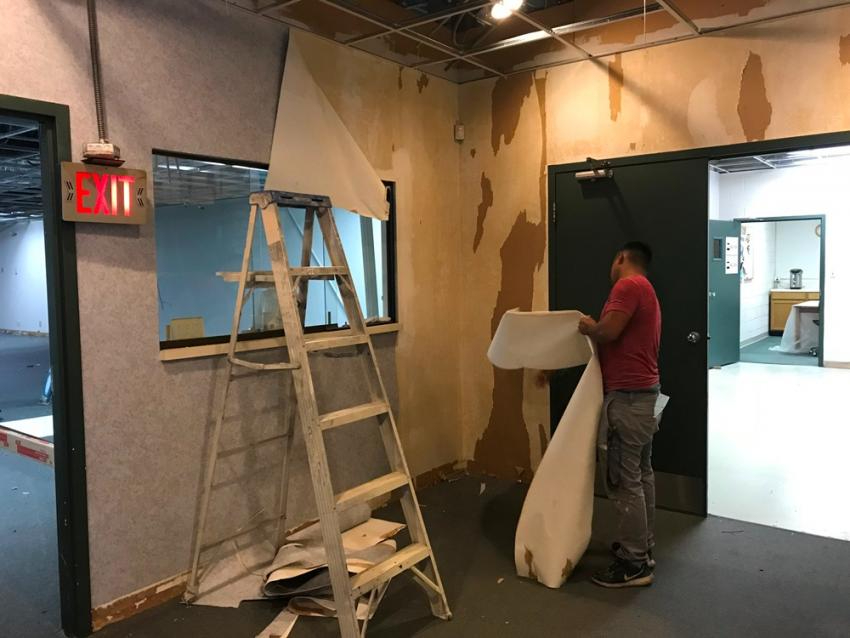
Our large training room now has new ductwork, all new electrical and network cables, and the freamework for new ceiling tiles has been completed. All the walls and doors received a fresh coat of paint as well. New flooring and new ceiling tiles will complete the work.
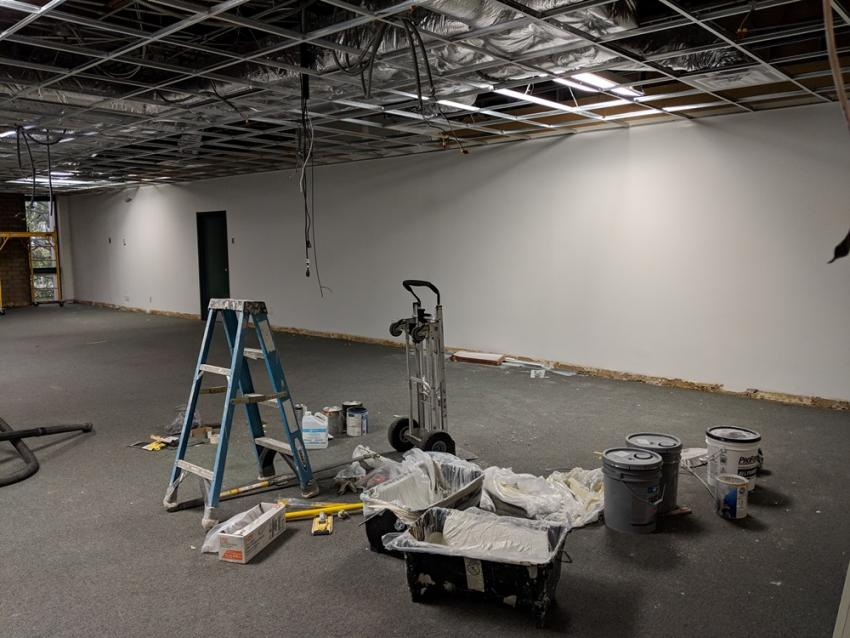
- Andrea Callicutt
- News
Our last "Please pardon our dust" update was in early August, but the renovation work here at Keystone is still ongoing. We are nearing the end of phase 2 of the project, and hope to soon begin phase 3 and see the light at the end of the tunnel.
In phase two, the east side of the building was 95% completed allowing folks on that side of the building to move back into their offices and cubes. The west side of the building (including Tracey, Mark, and all of our customer support team) then got to pack up and move into temporary space in our large training room.
Workmen have been busy in our project room, conference room, and the customer support area pulling down old ductwork and network cabling from the ceiling, installing all new ductwork, ceiling tiles and cabling, painting the walls, and installing new flooring and carpet. This is essentially done, and the movers come back this Friday to help move everything back. The last phase of the renovations will include our front lobby area and breakroom. Stay tuned! In the meantime, here's a couple photos from the last couple of months.
To see all the photos, check out the 2018 Keystone Office Remodeling album on our Facebook page.
Here are the movers setting cubes back up in the developers' area on the east side of the building after renovation work was completed there.
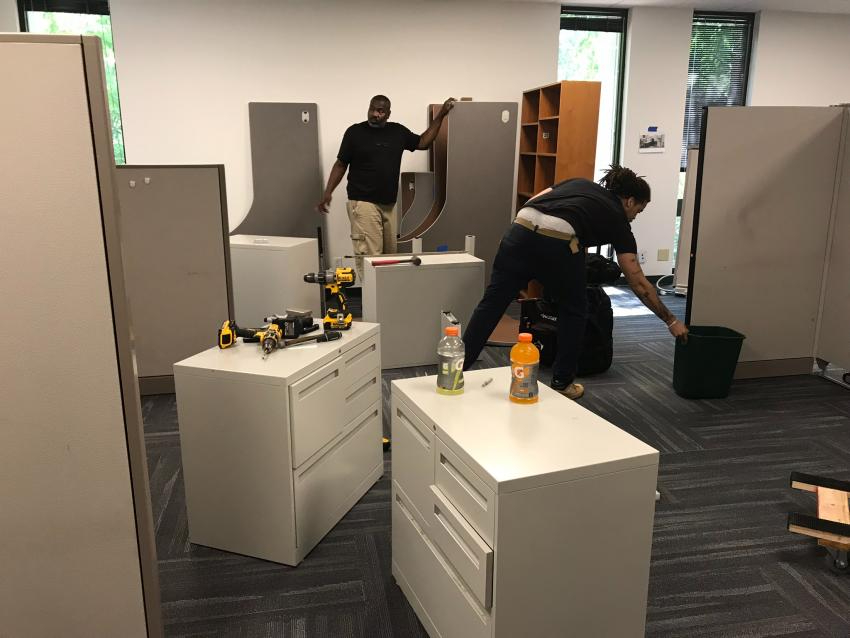
This is our temporary customer support area in the large training room. Yup, Nancy, Mark, John O, etc. are currently answering your calls from this space while the west side of the building gets renovated!
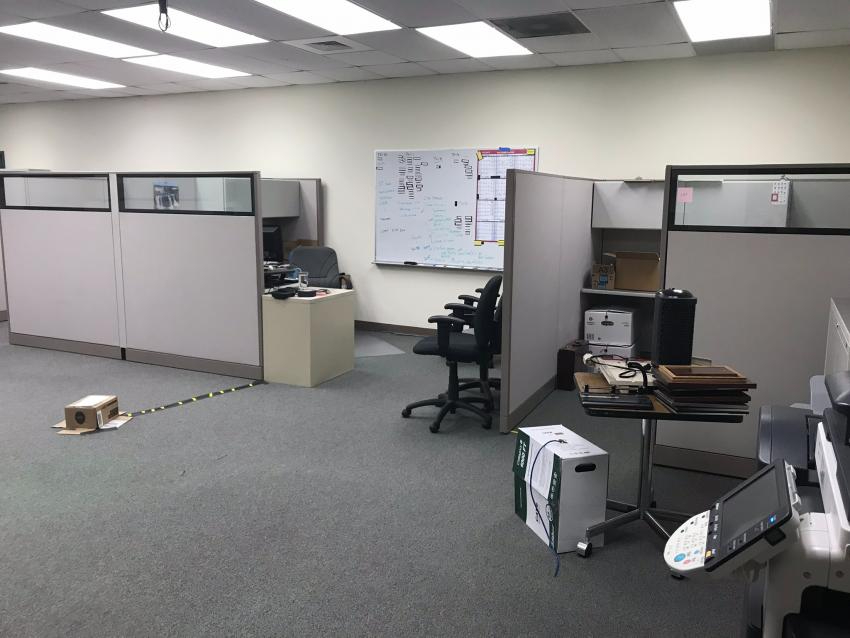
The customer support area now has new ceiling tiles, carpet, ductwork, network, and paint. Movers are scheduled to come Friday to move cubicles and furniture back into this space as well as the rest of the west side of the office.
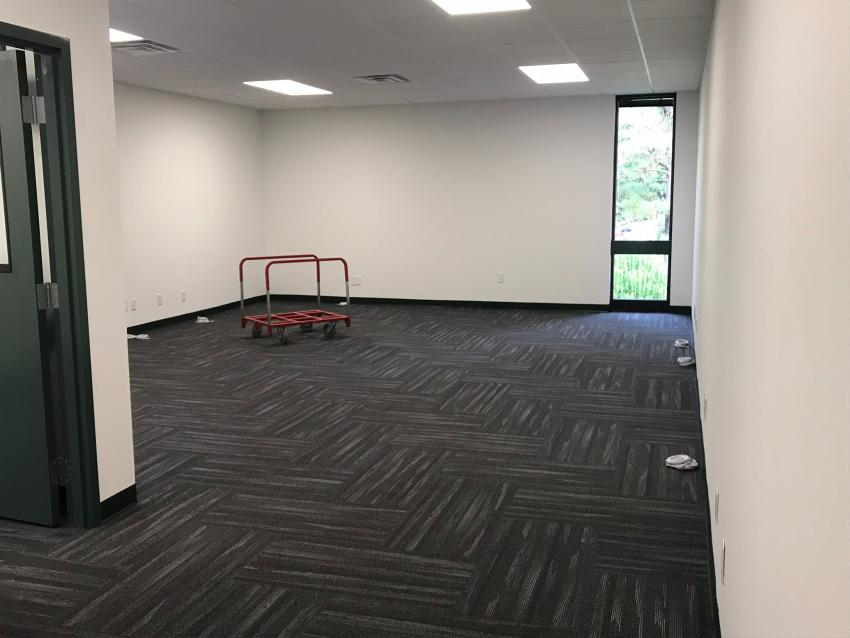
- Katy Patrick
- News
We’ve posted a lot lately about our emergency preparedness, but is there anything you all can do to keep a minor disaster from grinding your services to a halt?
There is!
If you experience a network outage, whether due to bad weather, service provider outage, or construction chopping through your network cable, you can still work on checking in returned materials. This method will work if you can’t log into KLAS or even if you can’t access the internet at all. All you need is a computer (a laptop on battery power is fine) and a scanner.
Here’s how:
- Open Notepad. Other word processors (such as Microsoft Word) can add formatting and metadata that will muddy the data. Basic Notepad leaves the text clean and ready to be imported.
- Scan or type in the shelf ID indicating where the books will be shelved.
- Scan the barcodes of everything for that shelf.
- Repeat steps two and three as needed.
- If you are on battery power, make sure to save the file frequently.
- Save the file. You can then go ahead and shelve the materials as if they have been checked in.
This is an example of how your file should look (with, of course, your own library’s shelf IDs):
123F
01291237437
21012913274
20129137423
123G
20390746787
39287179034
30927405972
Then, once order has been restored and you can access KLAS again:
- Open the Circulation Module – Batch Check In window.
- Use the Browse button at the bottom of the screen and select your saved file.
- The shelf locations and barcodes will be loaded in.
- Press Submit.
- KLAS will separate each shelf into a separate batch and check in each item.
Hopefully, you won’t need to employ this method. But if you do experience an extended network outage, there’s no need to let the books pile up!
As always, if you have questions or need some additional assistance contact KLAS Customer Support.
- Andrea Callicutt
- News
Welcome back to the "The Stars of Keystone Systems' Staff" series. Each will include some basic info and insight into one of our staff members. We hope these posts will provide you a look into who makes up our diverse, supportive, and knowledgeable staff.
Basic Stats:
Name of Staff Member: Nancy Underwood Honeycutt
Year Hired: 1998
Current Job Title: Manager, Customer Support
Getting to Know You Q&A:
Q: What is your favorite part of your job?
A: I enjoy helping people. It helps that the folks we work for are some of the nicest people around, and they’re doing a good service. So, I feel good when I can help them do that.
Q: What did you do before working for Keystone?
A: I was a middle and high school English teacher.
Q: What are your hobbies outside of work?
A: I do a lot of crafts, most recently quilting and crochet. I get a lot of satisfaction in seeing a project come together from its pieces.
Q: If you could go anywhere on vacation, where would you go?
A: I’d like to see Australia and New Zealand.
Q: Do you have any pets? If so, what kind and what are their names?
A: We’ve got three and a half cats. The three indoor cats – Maggie, Teddy and Wendy – are pretty happy kitties. Meanwhile, Stanley has been hanging out on the back deck for over a year. We’ve decided that we’d like him to come inside, particularly for the upcoming winter, so we’re working on that.
This is Maggie. She's looking on dubiously.
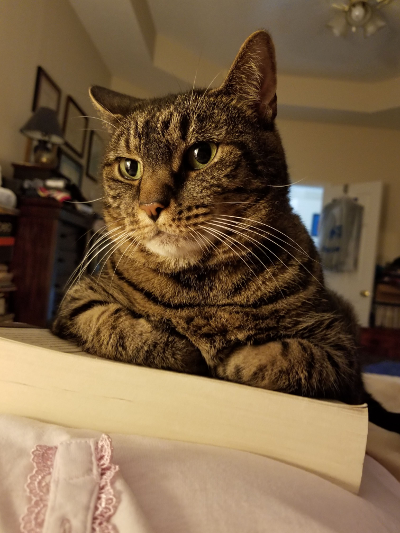
Here's Teddy with his tuxedo.
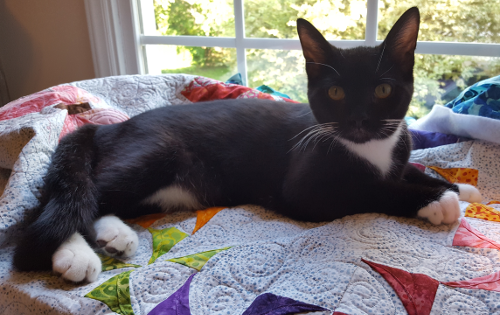
Wendy is the pretty tortie..
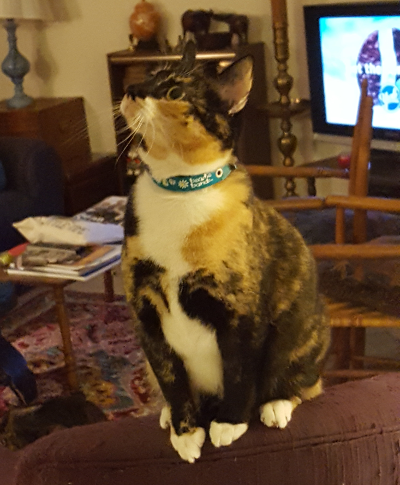
Maggie and Teddy are curled up on the cat tree inside while Stanley lays on the patio table on the deck outside the window.
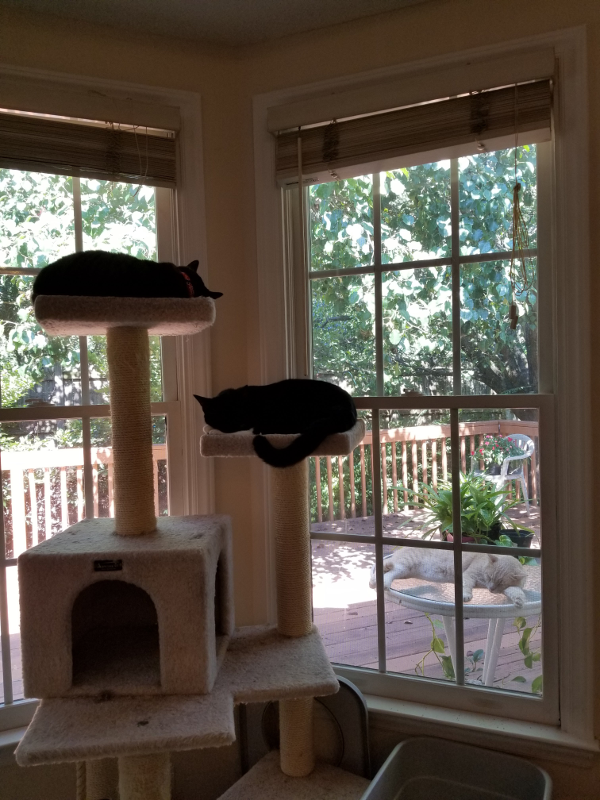
- Craig Hayward
- News
Hi all,
Here’s the Notes from The Scribe for October 2018.
A couple of cool new features and some improvements to our own processes have happened since September. Let’s go over some brief highlights since I last updated you all.
October saw the Inventory and Associate (IA) mode added. In this mode, you can add a cartridge to inventory and pair it with a patron at the same time. Meaning less worry about keeping an inventory available and also not having to tie up a staff member and their own computer while making cartridges available. To do this, you scan one barcode that puts The Scribe into Inventory and Associate mode. Then you take a batch of mail cards and cartridge labels printed out for each new patron added to this type of service and you pair them each to their own cartridges. When finished you scan another barcode, which puts The Scribe back into Duplication mode, and you’re now ready to duplicate items onto these cartridges.
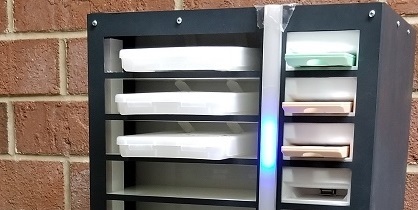
In conjunction with this process, the set up for the patron process for setting them up on this service was refined, so that before the actual mail card and label set was run for a patron cartridge, a set of books is already waiting to be duplicated. All fine adjustment of what the patron will receive on their first run is worked out first. This way, when staff puts The Scribe into Duplication mode things will run smoothly and the patron’s first books will be on their way right then.
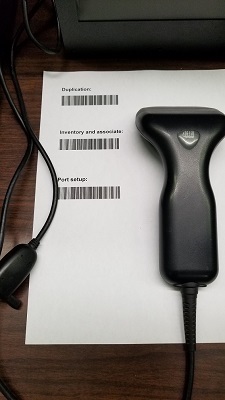
Related to this is another cool feature. You may have noticed that The Scribe doesn’t have a monitor attached to view anything happens while it’s running. As it turns out there is a monitor app that you can use to see the status of the cartridge slots and see what’s actually happening at each slot. This is a quick screen grab to give you an idea of what this looks like. This isn’t necessarily the final version, but it’s very useful even as is.
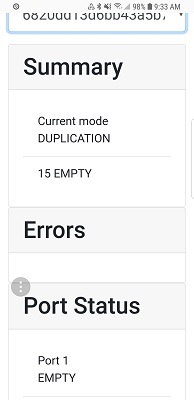
Another feature that was added, that many of you have now heard about, is the Service Queue tab in the Patron Module. This makes adding items to be duplicated on cartridge more efficient and easier. A very useful feature. Since we are fortunate to be the first users (the Guinea Pigs) we have been able to try it out, test it, and provide feedback for improvements. Some of which will be seen as things evolve into the system that will go live in the near future. For specific information about this exciting new feature, check out Drea Callicutt's article - KLAS Service Queue Sneak Peak.
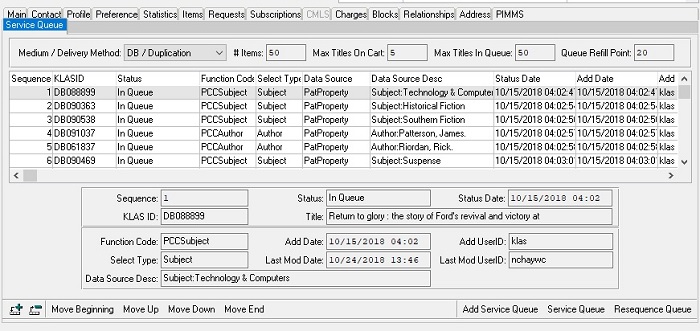
As a result of these enhancements, more processes were refined to match the workflow of our library and we held some more detailed staff training using these tools. Staff working together to put each other on the service so that we can all use the service ourselves and get a feel for what it will be like for patrons once we go live. This also gives us a chance to practice things in a more practical way.
We have had questions about from other about whether actual patrons are using this service yet. We are considering taking 5 to 10 willing patrons and letting them try out the service before we go live. The only downside to this will be having to import whatever hashads for books received during this time into the live database to keep our statistics accurate and to present issues to patrons once we move to the new live version. This is why we would only do this with a rough handful of patrons.
In any case, we are excited to move forward. That's all for this edition of Notes From The Scribe. The next edition will come out with the next round of updates and new features.
- Katy Patrick
- News
Hey, IRC/IMCs, do you feel ready for the APH Census? Wait, come back, no need to run for the hills just yet!
We know this is a big project for you all, and we want to help make it as painless as possible, as well as ensuring that you have all the accurate information you need.
Right now, we support two approaches to getting the census info: generating forms for the districts to fill out and return, or an all-online approach via WebOrder. Read on for more info!
If you want to know more or talk through which approach might be best for you, call or email Customer Support at .
One – Generating PDF forms to send via email
Working with OCALI’s AT&AEM Center, we developed the necessary tools to generate fillable PDF forms using the information on the district record. These forms can then be emailed to the district to be completed, signed, and returned. (If you plan to print and mail forms, rather than emailing a fillable PDF, that can be done with the existing Census notice—just let us know if you need some help setting it up!)
Once you receive the form back from the district, you would review and update the information in KLAS as needed, and run a program in the batch manager to verify it, automatically applying the necessary APH information. Once all of the census forms have been returned and verified, you can extract the APH data and upload it to the SRS.
This approach requires more data entry and more hands-on work in general from your staff, but offers full control over your KLAS data and an easy way to ensure that you have manually checked over all of the information you are passing on to APH.
Two – Online via WebOrder
Working with Tennessee School for the Blind’s Resource Center for the Visually Impaired, we developed the additional functions in WebOrder necessary to complete the APH Census online.
This allows your districts to enter and update their own information directly, including adding students, entering last medical report dates and other data, updating the status of students no longer in their district, and so forth.
When they’re ready, they will use a “certify census” page to do a final review, attest that they have the parental permission forms on file, and enter a digital signature. Once all districts have certified, you can extract the APH data from KLAS and upload it to the SRS.
This approach transfers the bulk of the data entry from your staff to the districts, but you will still need to review the records on your end. In particular, duplicate student accounts will likely be created (since they can’t see student records associated with a different district), requiring you to merge the accounts.
What works best for you?
There are benefits and downsides to both approaches, but we hope that either one will make the Census process a little easier and more reliable for you. They have both been successfully used, so now we are making them more widely available.
As part of the KLAS 7.7 release, we have been working on some back-end changes to standardize where and how APH data is stored. This will make it even easier for us to implement these processes for anyone who wants to try them. But in the meantime, you may be able to get started with an earlier version--just let us know how you want to approach the census, and we'll figure out if you need an upgrade.
- Andrea Callicutt
- News
Keystone's developers are working hard to add the duplication queue functionality to KLAS to support Scribe's high-capacity cartridge duplication-on-demand workflow. This development also serves as the basis to support KLAS' integration with the Gutenberg duplication system. In the future, it is possible the Service Queue may also be the basis for integration with NLS' wireless delivery of content. So, without further ado, here's a sneak peek of the new KLAS Service Queue Tab:
What is the KLAS Service Queue Tab?
The Service Queue Tab displays an ordered list of Reserves, Requests, Author Likes, and other profile based titles selected for a patron who will be served by Scribe.
What does the Service Queue Tab do?
The KLAS Service Queue Tab does the same type of title selection that nightly currently does for autoselect patrons. Rather than assigning those autoselected titles to a patron, it will send them to the Service Queue. The Service Queue is a list of titles to be included on a patron's cartridge. It lists all possible titles that could be sent to the patron by Scribe in sequence. If there are more title listed than will fit on a cartridge, the next title after a cartridge is full will be the first title of the following duplicated cartridge sent.
What does the Service Queue Tab look like?
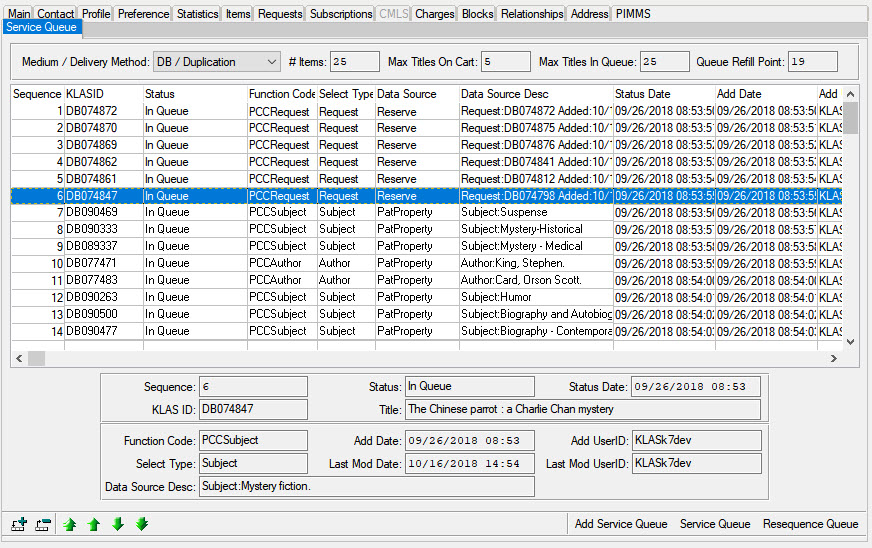
When looking at the KLAS Service Queue Tab, the Sequence column lists titles in the order they will be loaded onto a cartridge.
Example: Sequence 1 will be the first title to load onto a cartridge, followed by Sequence 2, etc. until the "Max Titles On Cart" is reached.
The Status column lets you know the current status of a title.
The Function Code Column lets you know which KLAS function added the title to the Service Queue.
The Select Type Column lets you know what the value was on the patron's profile that triggered the title to be selected.
The Data Source Column lets you know where the selection type originated. Refer to the Data Source Desc: field at the bottom of the screen for more detailed info including the specific patron property it is based on.
The Add Date, Status Date, and Last Modified Date Columns and fields give info about what happened to a title and when.
The toolbar has options allowing a user to manually add, deleted, or reorder titles within the KLAS Service Queue.
- Katy Patrick
- News
Hello, IRCs and IMCs!
I hope you were able to join us at the KLAS IRC / IMC Users' Meeting at the 150th APH annual meeting, but if not, we’ve got you covered. Read on for a couple highlights, and info on where to find more.
KLAS IRC / IMC Installs by State
7.6r2e Highlights
The latest version of KLAS includes some IRC / IMC-specific updates, especially to WebOrder. Here are a couple examples:
- Added a "My Account" link in the Main Menu of Web Order to allow a user to view their own record.
This does away with the need for that confusing “self” relationship. Users are now able to access their own record via the “My Account” link in the Main Menu instead of by searching for themselves. While this is a small change, we think it’s a big improvement!
- Added a "Change Patron Status" function
The new screen launches from a button on the Main Details screen and allows a user to request a status change and provide a reason.
For example, a requestor can change a former student’s status to Moved, with a reason of “moved to another district this summer.” If the new district registers the student, it will be easier to tell that it’s the same child and not just the same name. Plus, even if the new district is out of state, the student will already be correctly updated to remove them from the former district's APH Census count.
We can hide this button if you prefer the users contact you directly for all status changes. But if you choose to allow it, this is a great way to make updates quick and easy for both you and your requestors.
For more information about these updates and more, check out the KLAS 7.6r2e Full & Web Functions Release Lists.
7.7r1 Highlights - to be released Oct 2018
This upcoming KLAS release has quite a few behind-the-scenes adjustments that should make the staff-side KLAS application a little faster and better all around. For example, it will not require Admin Privileges to install, eliminates the need for Open VPN for remote users, and it supports more “special characters,” such as diacritics.
More Info
To learn more about the latest and upcoming updates, and watch demos of some of the new IRC features, make sure you’re logged in to KLASusers.com and check out the 2018 APH KLAS Users' Meeting Recording. (You must be logged into klasusers.com to access the article.)
Don’t have time to watch the recording? The 2018 APH KLAS Users' Meeting article has the PowerPoint slides available for download!
- Craig Hayward
- News
Hi all,
Notes from The Scribe is an attempt to share our experiences, here in North Carolina, with Duplication on Demand for patrons, using a newly developed high capacity duplication system called The Scribe. There's been lots of buzz about this system since the 2018 Users' Conference. Those of you who attended the conference got a little taste of things and may have heard about how we got to the creation of this system. Those who couldn’t be there, this is a bit of our story. My hope is to make this a more regular posting going forward so we can check in with y’all on how things are going. Please forgive some of the length, there's lots to say. Even more than what I could fit in this article. I promise some pretty pictures along the way to help ease some of the reading. Here’s a bit of our story.
Like many of you out there, North Carolina had planned at some point, in the future, to offer duplication on demand because we saw things going in that direction with the program. We had been using Gutenberg already to duplicate individual titles and our local magazines onto cartridges. We were comfortable with making things available this way. When NLS announced to the network back in December 2017 that it was cutting back on what it offered to libraries freely on a cartridge, we in NC saw that this may become an issue in our more immediate future and we felt a push in the back to implement something. Getting duplication on demand now became a priority. We were able to get together some LSTA funding and then talked to Keystone about how to go about creating something that would work for our library. For those not familiar we serve 12,000 patrons and run an average of 2000 mail cards per day. We are a large scale, high volume library. We needed something that would work with our workflow and not interrupt the way we served patrons. We feel like The Scribe system can do that.
Before I go much further, I would like to take a moment to thank and remember all of the libraries currently implementing and/or running Patron Centric Cartridge (PCC) Duplication on Demand systems. You all were the first adopters, the pioneers, and the ones who helped make The Scribe System a possibility. We heard the stories of all the things that didn’t work. All the delay. The various issues. Your pain was felt and understood, as part of the process of creating this system. It’s unfortunate that sometimes a transition of doing things in the best way can only be discovered after many other things have been tried out and tested. Just as our service is transitioning, so too will a system like this evolve based on lessons learned. In Keystone’s defense, the system implemented was based on looking at a readily available system (the Patron Centric one used in Iowa) and modeling it after that. Everyone talks about wanting Gutenberg to work with KLAS, but at the time of our experience, this wasn’t even an available option put forth by NLS. We can only do things with what’s possible at the time, particularly when you’re talking about grant money. We had a timeline and we needed to implement something.
After the rain and the storm, I feel like we are seeing the rainbow in The Scribe. Is it perfect right now? No. But things look very promising. There are some minor issues being ironed out in testing. In the end, it doesn’t matter to patrons what we do. They just want their books. Overall, we believe that most all of the major issues seen in other libraries using PCC have been addressed. Right now, going beyond all that, we’re on a test version of KLAS. We’ve had the system in the building for the last month so a couple of us could test it out and see where the issues are so we can tune things and make them right before we go live. What's great about the new version of KLAS is that it has been developed using an agile method, meaning that adjustments can be made much closer to real-time and updates can be pushed out as needed, so updates get pushed to us much faster, sometimes within hours.
Some may notice that we didn’t go the route of cartridge recycling. I’ll be honest, I had expressed a want for the potential of going to the cartridge recycling method at some point down the road and that option may be possible, but it wasn’t ready to be used with this system now. We needed to do something based on our situation. Since we are in a transition we can choose to go in many directions. We thought why not just go PCC and see what happens. Our processes will have to adapt anyway regardless of the method used. In the end, it’s about serving the patrons by whatever means.
The next phase of this project is a pilot with staff being served like patrons to see if there are any issues and so that staff can get more comfortable. Once this is complete, we'll move on to serving patrons.
That's all for this article. Stay tuned for more Notes from The Scribe where we'll share more of our experiences and some more pictures of things as they happen. I'll end this article with some pretty pictures so far of what’s happening.
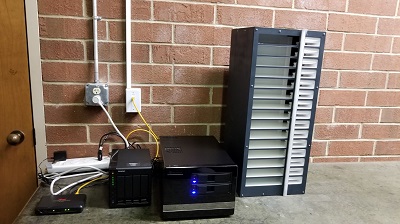
New Scribe Setup closest to the front of the warehouse. Lots of testing has been happening here. Pictured is the backup hard drive that stores the NLS BARD collection, the desktop processing unit communicates with KLAS and is the brains of the Scribe, and the duplication rack with 15 bays. We affectionately call this "Thing 1".
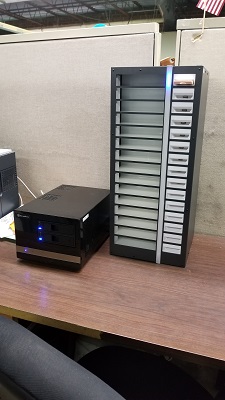
New Scribe Setup in the back of the warehouse in the circulation area. Pictured is the desktop processing unit that communicates with KLAS and is the brains of the Scribe, and the duplication rack with 15 bays. We affectionately call this "Thing 2".
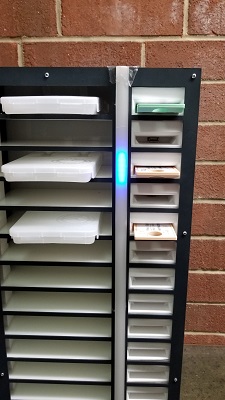
This is a cartridge being duplicated in the rack. Notice the light on the rack to indicate things are being duplicated.
- Andrea Callicutt
- News
Welcome back to the "The Stars of Keystone Systems' Staff" series. Each will include some basic info and insight into one of our staff members. We hope these posts will provide you a look into who makes up our diverse, supportive, and knowledgeable staff.
Basic Stats:
Name of Staff Member: Marion A. W. Campbell
Year Hired: 2008
Current Job Title: Customer Service Representative

Getting to Know You Q&A:
Q: What is your favorite part of your job?
A: Working with librarians and IRC staff.
Q: What did you do before working for Keystone?
A: I taught High School Chemistry. During my time teaching, I had two students who were blind and one who was deaf.
Q: What are your hobbies outside of work?
A: Glassblowing, Historical Reenactment, and Blacksmithing
Q: If you could go anywhere on vacation, where would you go?
A: Italy
Q: Do you have any pets? If so, what kind and what are their names?
A: Yes. 2 cats and a bunny. Tinkerbell is our older calico cat, and Bobbles is our black kitten. Bun Bun, the bunny, is a Jersey Wooly which is a dwarf / angora mix.
